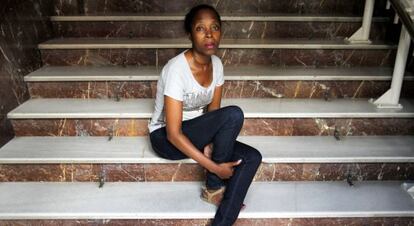“The government paid for my transplant and turned its back”
One year on, exclusion law for immigrant treatment has left 150,000 people without access to the public healthcare system

Cecilia Asuko Sami came to Spain in 1981 from her native Equatorial Guinea. She hadn’t planned on staying but she had family in Madrid and liked the city. She picked up jobs one after the other: cleaning, waiting tables and looking after senior citizens. In total, she worked for 26 years, always without any form of contract.
In 2007, she was diagnosed with a virus that had damaged her heart and a year later she received a life-saving transplant, after which she was required to take a course of up to a dozen drugs a day. But for over a year she has been unable to obtain the necessary medication because in 2012 her medical card expired and she cannot have it renewed due to the royal decree that came into force that year excluding immigrants without residency papers from the public health system.
Sami is one of some 150,000 immigrants who since September 3, 2012 have been subject to the new law, which only permits undocumented migrants under the age of 18 access to the emergency room and maternity care. Not all regions have adopted the law; Asturias, the Basque Country and Andalusia refused to implement it and still offer full access. But in others, including Madrid, the barriers facing immigrants to see a doctor or get a prescription are as immense as the walls on the frontier with Ceuta or Melilla.
I have to lie sometimes and say my card is being processed"
Sami is able to receive some of her treatment either through sympathetic staff at the health center or a social organization that runs a pharmaceutical donation program. “I have to lie sometimes and say my card is being processed,” she says. “I don’t understand how the government, after paying for a transplant, which is very expensive, has now turned its back. I haven’t seen a doctor in months.”
Despite NGOs referring cases such as Sami’s to the authorities, the government says there are no instances of care being withheld. Doctors Without Borders, though, says that hers is far from an isolated case. “We only know about a small part of the situation. There are many cases that do not reach us,” says Inés Díez de Frutos, of the Red Acoge NGO that helps Sami, adding that the law has also led to immigrants being denied attention in emergency rooms, as well as to pregnant mothers and minors, who are supposedly guaranteed care.
Tu suscripción se está usando en otro dispositivo
¿Quieres añadir otro usuario a tu suscripción?
Si continúas leyendo en este dispositivo, no se podrá leer en el otro.
FlechaTu suscripción se está usando en otro dispositivo y solo puedes acceder a EL PAÍS desde un dispositivo a la vez.
Si quieres compartir tu cuenta, cambia tu suscripción a la modalidad Premium, así podrás añadir otro usuario. Cada uno accederá con su propia cuenta de email, lo que os permitirá personalizar vuestra experiencia en EL PAÍS.
¿Tienes una suscripción de empresa? Accede aquí para contratar más cuentas.
En el caso de no saber quién está usando tu cuenta, te recomendamos cambiar tu contraseña aquí.
Si decides continuar compartiendo tu cuenta, este mensaje se mostrará en tu dispositivo y en el de la otra persona que está usando tu cuenta de forma indefinida, afectando a tu experiencia de lectura. Puedes consultar aquí los términos y condiciones de la suscripción digital.








































